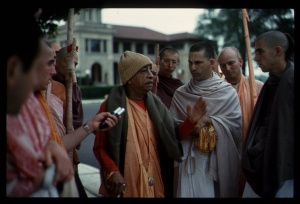SB 1.2.12 (1962)

A.C. Bhaktivedanta Swami Prabhupada
TEXT No. 12
Tat shraddhadhana munaya jnana vairagya yuktaya Pasyanti atmani cha atmanam bhaktya shruta grihitaya.
ENGLISH SYNONYMS
Tat—that, shraddhadhana—seriously inquisitive, munaya—sages, jnana—knowledge, vairagya—detachment, yuktaya—well equipped with, pasyanti—see, atmani—within himself, atmanam—the Paramatma, bhaktya—in devotional service, shruta—the Vedas, grihitaya—well received.
TRANSLATION
That Absolute Truth is realised by the seriously inquisitive student or sages well equipped with knowledge and detachment by performance of devotional service in terms of hearing the Vedanta Sruti.
PURPORT
The Absolute Truth is realised in full by the process of devotional service of the Lord Vasudeva or the Personality of Godhead who is the full fledged Absolute Truth. Brahman is His transcendental bodily effullgence and Parmatma is His partial representation. As such Brahman or Parmatma realisation of the Absolute Truth is partial realisation of the Absolute Truth. There are four different types of living beings. They are 1. the Karmis, 2. the jnanins, 3. the Yogins and 4. the Devotees. The Karmis are materialistic whereas the other three are transcendentalists. First class transcendentalists are the devotees who have realised the Supreme Person; Second class transcendentalists are those who have partially relised the plenary portion of the Absolute Person. And the third class transcendentalists are those who have barely realised the spiritual focus of the Absolute Person. As stated in the Bhagwat Geeta and other Vedic literatures the Supreme Person is realised by devotional service which is backed by full knowledge and detachment from the material association. We have already discussed the point that devotional service is followed by knowledge and detachment of material association. As Brahman and Parmatma realisation is imperfect realisation of the Absolute Truth so the means of realising Brahman and Parmatma i.e. the path of Jnana and yoga are also imperfect means of realising the Absolute Truth. Devotional service which is based on the foreground of full knowledge combined with detachment of the material association fixed up on the aural reception of the Vedanta Sruti,—is the only perfect method of realising the Absolute Truth by the seriously inquisitive student. Devotional service is not, therefore, meant for the less intelligent class of transcendentalist. There are three classes of devotees namely first, second and third class. The third class devotees or the neophytes who have no knowledge neither detachment from the material association but are simply attracted with the preliminary processes of worshiping the Deity in the temple are called material devotees. Material devotees are more attached to material benefit than transcendental profit. Therefore, one has to make definite progress from the position of material devotional service to the second class devotional position. In the second class position the devotee can see four principles in the devotional line namely, the Personality of Godhead, his devotees, the ignorant and the envious. One has to raise himself at least to the stage of a second class devotee and thus become eligible to know the Absolute Truth.
A third class devotee, therefore, has to receive the instructions of devotional service from authoritative sources of Bhagwat. No. 1 Bhagwat is the established personality of devotee and the other Bhagwat is the message of Godhead. The third class devotee has, therefore, to go to the Personality of devotee in order to learn the instructions of devotional service. Such Personality of devotee is not a professional man who earns his livelihood by the business of Bhagwat. Such devotee must be a representative of Sukdeva Goswami like Sūta Gosvāmī and must preach the cult of devotional service for all-round benefit of all people. A neophyte devotee has very little taste for hearing from the authorities. Such neophyte devotee makes show of hearing from the professional man and dictates to the professional man to satisfy his senses. This sort of hearing and chanting has spoiled the whole thing and one should be very much careful about the faulty process. The holy messages of Godhead as they are inculcated in the Bhagwat Geeta or in the Srimad Bhagwatam are undoutedly transcendental subjects but even though they are so, such transcendental matters are not to be received from the professional man who spoils the whole thing like the serpent spoils the milk simply by touch with the tongue.
A sincere devotee must, therefore, be prepared to hear the Vedic literature like the Upanishad, Vedanta and other literatures left by the previous authorities or Goswamins for the benefit of his progress. Without hearing such literatures nobody can make actual progress. And without hearing and following the instructions the show of devotional service becomes an anachronism and therefore a sort of disturbance in the path of devotional service. Unless, therefore, devotional service is not established on the principles of Sruti, Smriti, Puranam, Pancharatra authorities, the make show of devotional service should at once be rejected and an unauthorised devotee should never be recognised as pure devotee. By assimilation of such messages from the Vedic literatures one can see the all pervading localised aspect of the Personality of Godhead within his own self constantly. This is called Samadhi.